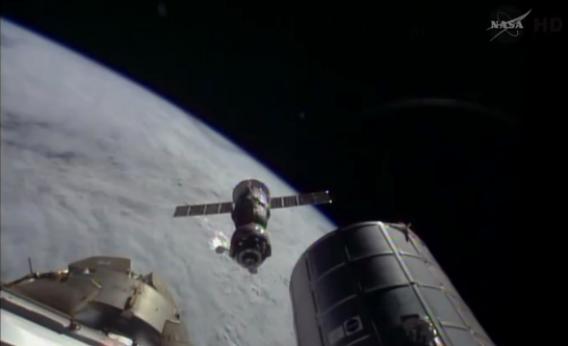Create a free profile to get unlimited access to exclusive videos, sweepstakes, and more!
Russian Deputy Prime Minister Threatens to Pull Out of ISS

As you may know, I am not happy when politics interfere with science and space exploration. Unfortunately it happens all too often, especially because, in many cases, the government controls the money used for those endeavors.
And we’re seeing one of the consequences of that right now. Dmitry Rogozin, deputy prime minister of Russia and head of the space and defense industry, has threatened to pull Russia out of the International Space Station by 2020.*
This escalates the rhetoric quite a bit in the ongoing back-and-forth between the U.S. and Russia. This started with the Russian invasion of Ukraine; President Obama placed sanctions on certain officials in Russia, including Rogozin. This made it impossible for the U.S. rocket company United Launch Alliance to get Russian-built engines it needs for certain launches (including military/national security missions). SpaceX, for its part, sued ULA in an effort to make sure it couldn’t purchase new Russian engines. ULA is fighting that lawsuit.
On Tuesday, Rogozin held a briefing where he made some rather bold statements. For one, he said that Russia only needs ISS until 2020, clearly implying that Russia can pull out of the project at that time. Just to make that even more clear, he later stated (roughly translated), “The Russian segment [of the ISS] … can exist independently from the U.S., the American segment of Russia cannot exist independently. It’s the specifications of the station.”
In other words, they don’t need us, but we need them. This is more-or-less true; Zvezda (the Russian module that is the center of their operations on ISS) has the propulsion module, for example, and other critical components needed to keep the station’s life support running. However, this may not be a complete trump card; when Zvezda was being built, the U.S. built a backup Interim Control Module in case something went wrong (Russia was having big financial woes at the time Zvezda was under construction). The ICM is still around, near Washington, D.C. Of course, it’s not entirely realistic that we can launch the ICM and install it should the Russians take their own module away, but then it's not all that realistic for them to take their module away in the first place. It's a bit over-the-top to say they can keep their own part of the ISS and let the rest hang. It has the feel of something a villain from a 1980s-era James Bond movie would say.
My point: We’re seeing a lot of saber-rattling here, but this is in fact complicated. I’m hoping that’s all it is. As a case in point: from the briefing (and even though the translation provided by Google is a little shaky) it’s clear that Rogozin is not happy about the U.S. sanctions. He said they were like “swinging an ax in a china shop.”
Rogozin didn’t stop there though. He also threatened to switch off a series of U.S. GPS stations in Russia if the U.S. doesn’t come to an agreement about installing Russian counterpart stations in the U.S. by June 1. These stations are used for geodetic (geological measurement) studies; my friend Mika McKinnon has more about this at io9.
Also, Rogozin has said Russia will stop selling other rocket engines to the U.S. as well; in this case Ars Technica has the details of that.
This whole situation is a mess, and it’s not clear to me how much of it is serious and how much is bluster; 2020 is a ways off, and regimes change. As do means of getting to space: SpaceX may be able to transport humans to the ISS in a couple of years, and other companies are angling that way as well. That will certainly change the leverage of both countries.
But in the here and now, this isn’t some routine negotiation where egos can be assuaged and palms greased. The cause behind this is very serious and very real; the Russian government ordered the invasion of another sovereign country, and, as head of the defense industry, the man who also runs their space program is neck deep in that decision.
Regular readers may know that I have not always supported the idea of the ISS because initially it didn't have a well-defined purpose. But that was years ago; now it's built, and it works. It makes sense to use the thing to do science and learn how to explore space.
I have no idea how this will go. But I can’t help but note the irony: This happens the same day a Russian Soyuz capsule successfully brought home three astronauts from the ISS, including an American and a Russian. We’ve come a long, long way since the Cold War days … only to sometimes find we haven’t come very far at all.
Thanks to my friend Jonathan McDowell for his thoughts on the space exploration aspects of this; he is an expert on such things and worth following.
*Correction, May 14, 2014: This post originally misspelled the first name of Dmitry Rogozin.


























